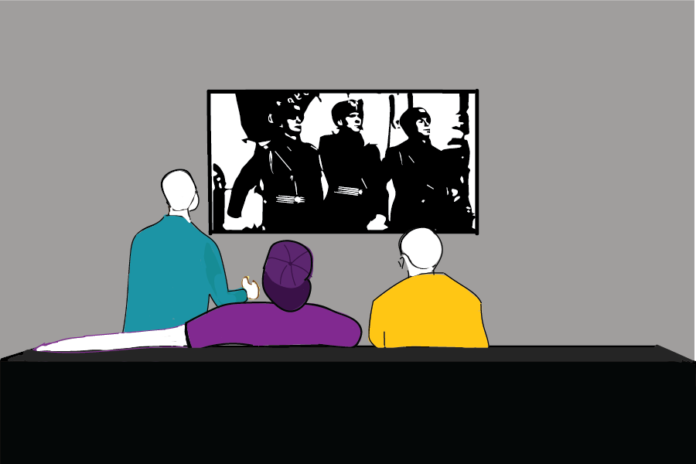The rise of Soviet nostalgia signals a lack of closure
On Dec. 26, 1991, the infamous hammer and sickle flag lowered, and the red, white and blue Russian flag took its place. In just one night, a new nation was established alongside 14 others.
Twenty-eight years since the fall of the Soviet Union, and its presence still haunts Russia today. Across the country, statues of wartime leader Joseph Stalin remain erect, reruns of old movies play nonstop and Soviet-themed eateries serve customers without a smile.
Despite the failed economic policies and restricted civil rights that plagued the Soviet state, there was little celebration at its demise. President Vladimir Putin even called the collapse “the greatest geopolitical catastrophe of the century.”
With 66% of Russians regretting the breakup of the USSR, the longing for Space Race exhilaration and victory day parades speaks to the overwhelming nostalgia that defines the “post-Soviet era” — a term that further implies this hesitancy to move forward.
While most Russians occasionally partake in nostalgia through television and music, others actively live out the past in the modern era.
“Compared to our government now, Stalin is a god,” said a member of Essence of Time, a pro-Kremlin, Stalinist group.
Led by Russian scientist Sergey Kurginyan, the group’s objective is to restore the USSR by fixing the mistakes of the past and implementing new principles founded in communism.
And although history has proved Stalin to be a dictator who terrorized his people, many Russians refuse to acknowledge this and still commemorate him as a great leader. Footage of past victory parades with Stalin’s portrait held high play on Russian television every year as a reminder of the nation’s former glory.
Some Russians even maintain conspiracy theories that the document dissolving the Soviet Federative Socialist Republic, signed by then-President Boris Yeltsin, is illegal –– meaning that the Soviet Union still exists.
They carry Soviet passports, evade taxes and disobey laws that would otherwise validate their Russian citizenship. In these extreme cases, nostalgia verges on disillusionment.
“For the past 28 years I’ve tried to live in this country called Russia,” said Soviet revivalist Konstantin Vyatkin. “But in my heart I still live there, in the Soviet Union.”
More generally, nostalgia is fed through Russian media. The television channel “Nostalgia” is dedicated to broadcasting music, movies and TV shows of the 70s and 80s. They even recently launched a YouTube channel. Besides airing reruns, the channel features a segment during which guests discuss historical events from the USSR.
The Museum of Soviet Arcade Games also serves as an archive of childhood memories. With 50,000 daily visitors in the Moscow and St. Petersburg location, its success speaks volumes on Russia’s obsession with the past.
Of course, cultural nostalgia is not exclusive to Russia. Many Americans seek out vintage diners to eat at or record stores to shop at in the hopes of reimagining an era they may have never lived.
But with reminiscing about the good times comes the danger of romanticizing the bad. As a political system, the Soviet Union was far from perfect. In the same way that Americans fluctuate between admiring the retro aesthetics of the 50s and acknowledging the reality of segregation, oversimplifying history risks diminishing past evils.
Growing up, I noticed my Armenian grandma using the names “Russia” and “the Soviet” interchangeably. Although she’s well aware of the difference, the two have come to mean the same, even decades later.
For former states like Armenia, the period of Soviet rule was a golden age. But for other nations who suffered under communist rule, the collapse was a blessing.
The uncertainty of the current political climate could very well be the reason for Soviet nostalgia. While both the Soviet Union and present-day Russia experienced their fair share of economic recessions, the USSR still stood proudly as a beacon of hope. And although Putin may try to recreate the nation’s former “greatness,” that chapter has already closed.
Written by: Julietta Bisharyan — jsbisharyan@ucdavis.edu
Disclaimer: The views and opinions expressed by individual columnists belong to the columnists alone and do not necessarily indicate the views and opinions held by The California Aggie





